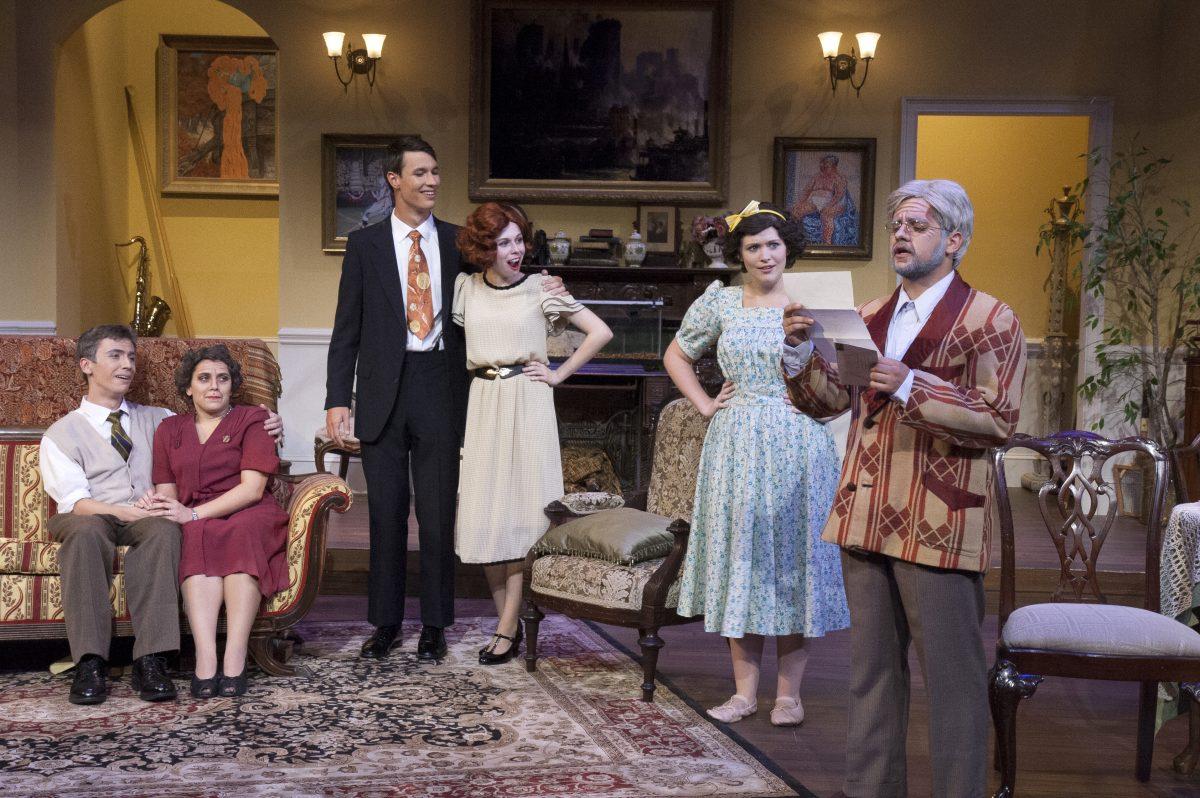
Courtesy of Ronald Foreman/University Theater
Theater
Thursday evening marked the beginning of University Theatre’s 2014-2015 season with the opening of You Can’t Take it With You, a comedy by George S. Kaufman and Moss Hart performed by a cast of NC State students.
The play is set in New York City in 1936, where the audience peers into the home of the Sycamore family. The Sycamores are all quite eccentric, but it is evident that they dearly love each other. Problems begin to arise, however, when one of the daughters of the family, Alice Sycamore, becomes engaged to Tony Kirby, the son of the owner of the company she works for. She is convinced the batty Sycamores and the “normal” Kirbys can’t mix, and through a series of interesting events she learns that being happy is truly all that matters.
Teal Lepley, a sophomore in English and the actress who plays Alice Sycamore in the production, said the cast and crew had a little less than a month to put the show together.
“A month after the night of auditions is opening night. We had rehearsal every day, 7:30 to 10:30; it’s about three hours every day,” Lepley said. “We get Saturdays off, except for Tech Week.”
The show was directed by John C. McIlwee, the director of University Theatre.
Lepley said rehearsals are fast-paced, with blocking (a term in theater for adding movement to the scene) beginning the second day of rehearsal.
“In the days after auditions after the cast list comes out, you have to go to the theater and pick up your script,” Lepley said. “The first rehearsal, we all sit down, the director and the stage manager and everybody, and we kind of introduce ourselves and then we all read through the script, just sitting there in a circle to get an idea of what we are working with, and the next day we start blocking.”
Lepley said some actors got to work with acting coaches on their accents and portrayal of relationships. Lepley was coached with Randy Cain, a junior in business administration. Cain plays Tony Kirby in his third University Theatre production.
Cain said performing in the show is much better with an audience because of the energy it brings to the table.
“[The audience] makes you react differently, makes your cues pick up better, you get a better feel of the scene and you just have a better time,” Cain said. “I know when we were getting towards the end of rehearsals, it felt like we were missing something, and then we had our first preview, something just clicked. It just gets better and better every night.
The cast of the play was larger than usual. You Can’t Take it With You uses 18 actors, which is a very large cast for University Theatre, according to Lepley.
“The last few shows besides the musical have been casts of four to eight,” Lepley said. “It’s always a bit more complicated because you have to figure out, ‘OK, how do I relate to this person?’ or ‘how do I relate to that person?’ But the cast, a lot of them are University Theatre veterans. So that made things a lot easier.”
The wigs were designed by Adrienne McKenzie, who was in charge of costume and hair design for the production, Laura J. Parker, the costume shop manager, and McIlwee.
“It’s a fun show, and we would love to have lots of students in the audience, and just having a good time, and letting them see what University Theatre is about, because we are open to students,” Cain said. “It’s a nice home for everyone. We are all supportive of each other, and we’d love for people to see what University Theatre is about and the show is a really great example of what it is and a lot of the scenes embody University Theatre.”
Lepley said working with in the play was an amazing experience.
“New or old, we just become one huge family.” Lepley said. “We’ve been through this together for weeks and weeks, and through crazy costumes and fumbling with lines, and we become one big family.”
Lepley said the phrase “you can’t take it with you” means not worrying about the fleeting tangible things like money or success and achieving true happiness.
“You can’t take it with you—most people go about their lives trying to be successful, but in the end, isn’t it all about being happy?” Lepley said.